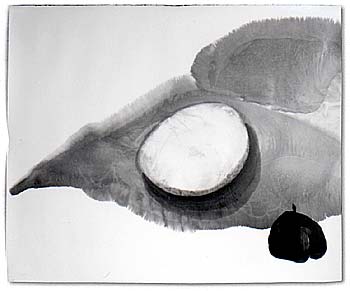Gao Xingjian
Prose
Excerpt from One Man’s Bible
by Gao Xingjian
English
Swedish
French

Painting by Gao Xingjian.
Excerpt from One Man’s Bible
54
You no longer live in other people’s shadows nor treat other people’s shadows as imaginary enemies. You just walked out of their shadows, stopped making up absurdities and fantasies, and are now in a vast emptiness and tranquillity. You originally came into the world naked and without cares and there is no need to take anything away with you, and if you wanted to you wouldn’t be able to. Your only fear is unknowable death.
You recall that your fear of death began in childhood and that your fear of death was much worse then than it is now. The slightest ailment made you worry that it was an incurable disease and when you fell ill you would think up all sorts of nonsense and be stricken with terror. Your having survived so many illnesses and even disasters is purely a matter of luck. Life in itself is an inexplicable miracle and to be alive is a manifestation of this miracle. Is it not enough that a conscious physical body is able to perceive the pains and joys of life? What else is there to be sought?
Your fear of death arises when you are mentally and physically frail. There is the feeling of not being able to breathe and you are anxious that you will not be able to last until you can take your next breath. It is as if you are falling in an abyss, this sensation of falling was often present in dreams during childhood and you would wake in fright drenched in perspiration. In those days there was nothing wrong and your mother took you for many hospital examinations, nowadays even under the doctor’s instruction to have an examination, you repeatedly procrastinate.
It is absolutely clear to you that life naturally ends and when the end comes the fear vanishes, for this fear is itself a manifestation of life. On losing awareness and consciousness life suddenly ends, allowing no further thought and no further meaning. Your affliction had been your search for meaning. When you began discussing the ultimate meaning of human life with friends of your youth you had hardly lived, it seems that now you have savoured virtually all of the sensations to be experienced in life you simply laugh at the futility of searching for meaning. It is best just to experience this existence and to take care of this existence.
You seem to see him in a vast emptiness, faint light comes from an unidentified source. He is not standing on some specific or defined patch of ground and he is like the trunk of a tree but has no shadow, and the horizon between the sky and the earth has vanished. Or, he is like a bird in some snow-covered place and is looking from one side to the other. Occasionally, he stares right ahead as if deep in thought, although it’s not clear what it is that he is pondering. It’s simply a gesture, a gesture of aesthetic beauty. Existence is actually a gesture, a striving for comfort, stretching the arms, bending the knees, turning around, to look back upon his consciousness. Or, it may be said that the gesture actually is his consciousness, that it is you in his consciousness, and from this he is able to gain some ephemeral happiness.
Tragedy, comedy and farce do not exist but are aesthetic judgements of human life that differ according to person, time and place. Feelings too are probably like this and the emotions of the present at some other time can fluctuate between the sentimental and the ludicrous. And there is no longer the need for mockery as self-ridicule or self-purification seem already to be enough. It is only in the gesture of tranquilly prolonging this life and striving to comprehend the mystery of this moment in time that freedom of existence is achieved, for in solitarily scrutinizing the self the perceptions of the self by others loses all relevance.
You don’t know what other things you will do or what else there is to do but this is of no concern. If you want to do something you proceed to do it, it’s fine if it is done but if it is not it doesn’t matter. And you do not have to persist in doing something for if at a particular moment you feel hungry and thirsty you simply go and have something to eat and drink. Of course you continue to have your own opinions, interpretations, tendencies and can even get angry as you haven’t got to the age when you no longer have the energy for anger. Naturally, you still become indignant but it is without a great deal of passion. Your capacity for feelings and sensory pleasures remains intact but as this is so then so be it. However there is no longer remorse, remorse is futile and, needless to say, damaging to the self.
For you only life is of value, you have a lingering attachment to it and it continues to be interesting as there are still things to discover and to amaze you, and it is only life that can excite you. That’s exactly how it is with you, isn’t it?
Copyright © Gao Xingjian 1999
Copyright © Translation by Mabel Lee 2000
Excerpt selected by the Nobel Library of the Swedish Academy
Nobel Prizes and laureates
Six prizes were awarded for achievements that have conferred the greatest benefit to humankind. The 14 laureates' work and discoveries range from quantum tunnelling to promoting democratic rights.
See them all presented here.
